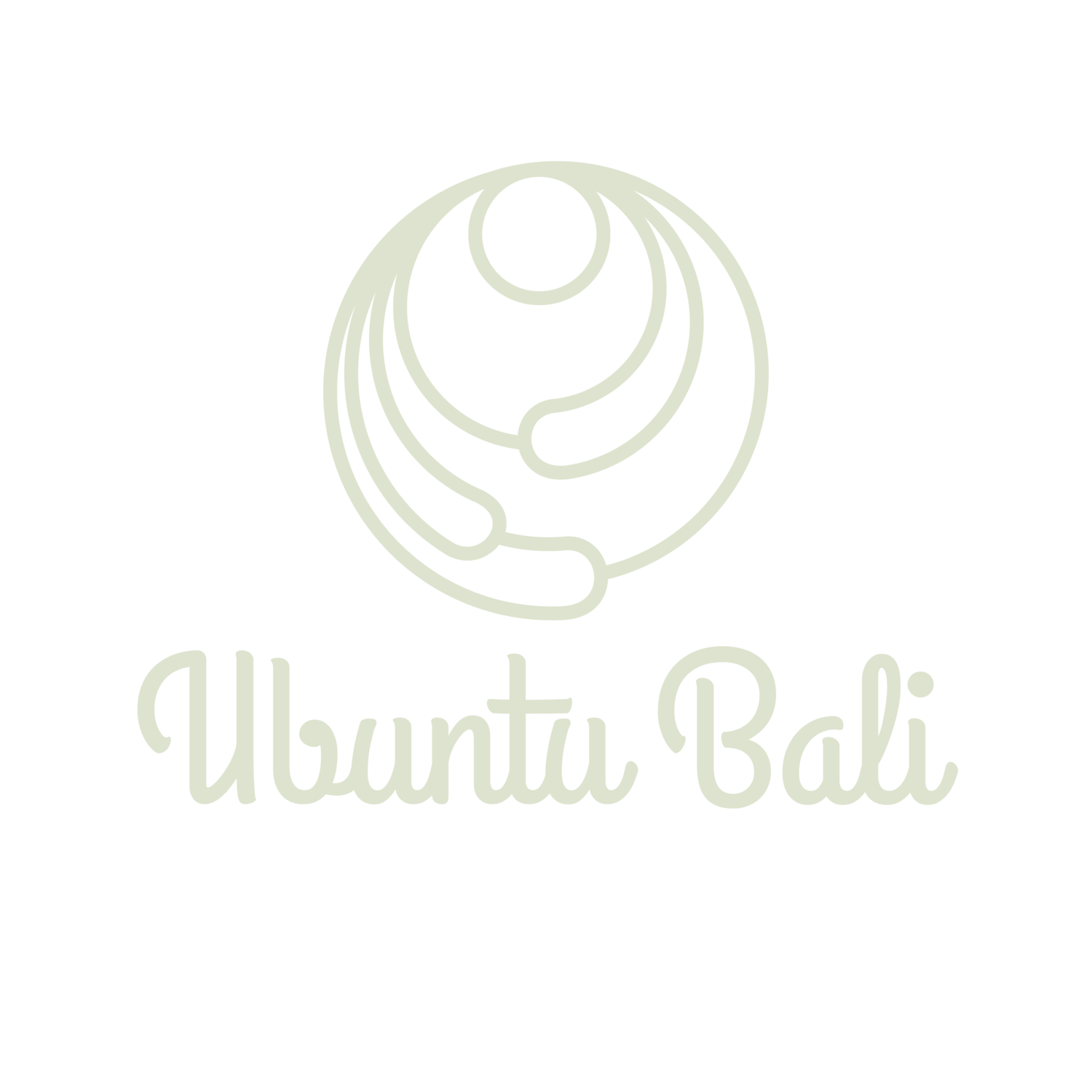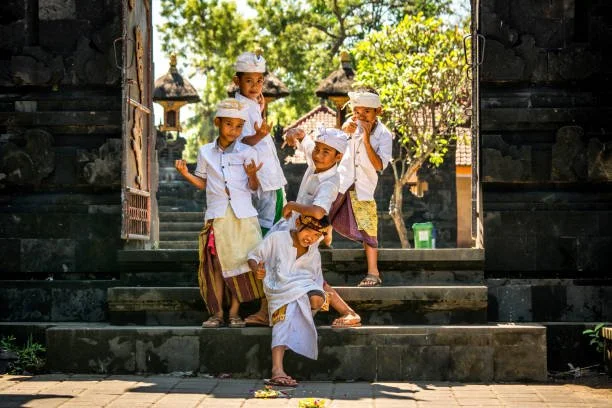Rituals of Kindness: Lessons from Bali
Made arrives at my studio every morning at 6:30 AM sharp, not because she has to, but because this is simply when the day begins. She carries a small basket woven from pandan leaves, filled with frangipani flowers, rice, and tiny banana leaf packets of offerings that she's prepared before dawn.
I used to watch her from the window, feeling guilty about my own late start to the day, my scattered morning routine, my phone already buzzing with the outside world's demands. But over months of living in this spiritual heart of Bali, Made has become an unexpected teacher in something I never expected to learn from a housekeeper: the gentle art of self-compassion.
The Morning Offering: Starting with Gratitude, Not Goals
Made's first act isn't to sweep or clean or tackle any task from a productivity list. She places small offerings; canang sari, at the entrance, in the garden, by the water fountain. Each one is a tiny prayer of gratitude, an acknowledgment of the spirits that protect the space, a moment of connection between heaven and earth before the day's work begins.
"Mbok," she told me one morning when I asked about this ritual, "we must say thank you first, before we ask for anything."
This simple wisdom hit me like a gentle slap. How often do I begin my day by immediately diving into what needs to be fixed, accomplished, or improved about myself? My morning routine used to be a mental assault: what I should have done yesterday, what I need to do today, how I'm already behind before I'm even fully awake.
Watching Made, I began to understand that self-compassion might start not with elaborate self-care routines, but with a simple "thank you" to the body that carried me through yesterday, the mind that's ready for another day, the heart that keeps beating despite all my worries and criticisms.
The Art of Unhurried Movement
There's a particular way Made moves through her tasks that I initially mistook for slowness. She doesn't rush from sweeping to mopping to watering. Instead, she completes each action fully, with attention, before moving to the next. When she waters the plants, she actually looks at each one—noticing which leaves need trimming, which flowers are blooming, which pots need repositioning for better sunlight.
"In Bali, we have concept called 'ngayah,'" my neighbor Kadek explained to me. "It means to work not for money or recognition, but as service, as meditation. When work becomes offering, it's no longer burden."
This completely reframed how I think about daily tasks—and about treating myself with care. I realized I'd been approaching self-compassion like another item on my to-do list: meditate for 20 minutes (check), practice gratitude (check), be kind to myself (check). But Made's way of moving through the world showed me that self-compassion isn't something you do—it's a quality of attention you bring to whatever you're already doing.
When the Chickens Escape: Finding Peace in Chaos
Last month, the neighbor's chickens escaped and decided our garden was their new home. I watched my stress levels spike as they destroyed the carefully tended plants, left droppings everywhere, and generally created chaos in what I'd come to think of as "my" peaceful space.
Made's reaction was completely different. She laughed… actually laughed… at the sight of five chickens pecking at the hibiscus flowers. "Chickens also need beauty," she said, gently shooing them toward the gate while somehow managing to protect the plants without distressing the birds.
Later, as we cleaned up the mess together, she told me a story about her own life: how her husband lost his job during COVID, how they had to move back in with his parents, how her carefully planned future suddenly became uncertain. "I very angry first time," she admitted. "But anger doesn't change situation. Only make heart more tired."
"So what did you do?" I asked.
"I make offering. I ask for patience. Then I look for what is still good—we have family, we have health, we have roof. Chickens teach us: sometimes life is not organized like we want. But still can find what we need."
This wasn't toxic positivity or spiritual bypassing. It was practical wisdom born from real experience with loss and disappointment. Made wasn't pretending the difficulties didn't exist; she was choosing where to put her energy.
The Power of Shared Silence
One afternoon, Made found me crying on the terrace after a particularly difficult phone call with family. Instead of asking questions or offering advice, she simply sat down beside me and began folding the laundry she'd been carrying.
We sat together in silence for maybe ten minutes—her folding, me crying, the afternoon light filtering through the tropical canopy above us. When my tears slowed, she handed me a glass of water and said quietly, "Sometimes heart needs to be empty before it can be full again."
This moment taught me something profound about self-compassion that all my therapy and self-help books had missed: sometimes the kindest thing we can offer ourselves isn't solutions or strategies or positive affirmations. Sometimes it's just the gentle presence of allowing our feelings to exist without trying to fix them immediately.
In Balinese culture, there's space for the full spectrum of human emotion within daily life. Grief and joy, celebration and sorrow, all have their place in the rhythm of existence. This stands in stark contrast to the Western tendency to pathologize sadness or treat emotional pain as a problem to be solved quickly.
The Ceremony of Small Things
What strikes me most about Balinese daily life is how ordinary activities are elevated to sacred acts through attention and intention. Made doesn't just cook rice—she washes it with care, adds the right amount of water, tends to the flame, offers the first serving to the gods before serving humans. The rice becomes not just sustenance but ceremony.
I began applying this principle to my own daily routines. Making coffee became a morning ritual rather than fuel for productivity. Taking a shower became a cleansing ceremony rather than just hygiene. Walking to the warung for groceries became a walking meditation rather than just an errand.
This shift didn't require any additional time or elaborate practices. It simply required the same quality of attention that Made brings to everything she does—the recognition that caring for ourselves is sacred work, worthy of presence and respect.
Community Without Comparison
In the banjar (neighborhood community), there's a beautiful rhythm of mutual support that flows naturally through daily life. When Wayan's motorbike broke down, three neighbors appeared without being asked, each bringing different tools and skills. There was no discussion of who was more generous, no keeping score of favors.
"We call this gotong royong," Ketut explained. "We help because we are community. Today I help you, maybe tomorrow you help me, maybe next year you help someone else. Circle always complete."
This model of community support reveals a different way to think about self-compassion. Instead of treating it as purely individual work, it becomes part of a larger web of care that includes how we treat ourselves and how we allow others to care for us.
The Wisdom of Accepting Imperfection
Balinese crafts are deliberately imperfect. There's always a small flaw in the temple carvings, a slight irregularity in the woven offerings, a color that doesn't quite match in the traditional paintings. "Perfect is for gods," Made explained when I asked about this. "We are human. Human makes beautiful with small mistakes."
This philosophy has been revolutionary for my relationship with my own imperfections. Instead of seeing my flaws as things to fix or hide, I'm learning to view them as evidence of my humanity—not obstacles to love, but integral parts of what makes me real.
Finding Your Rhythm in Community
Living in this wellness haven has taught me that self-compassion isn't a solitary practice. It flourishes in community, in shared rhythms, in the witness of others who understand that we're all doing our best with what we have.
Whether it's joining the early morning walkers who circle the rice fields at sunrise, or finding your place in a yoga community where showing up is valued over perfect execution, there's something powerful about beginning each day surrounded by others who are also choosing to take care of themselves.
The beauty of practices like Ubuntu Bali's morning Mysore classes is how they mirror this Balinese approach to community and self-care—creating a space where individual practice happens within a supportive collective, where everyone moves at their own pace but nobody practices alone. These yoga classes in Canggu offer more than just physical practice; they provide a daily opportunity to cultivate the same mindful presence that Made brings to her morning offerings. (Bring this presence to your body in our yoga classes).
Made has taught me that compassion—toward ourselves and others—isn't about grand gestures or perfect understanding. It's about showing up consistently, with attention and care, to the ordinary moments that make up a life. It's about starting each day with gratitude, moving through tasks with presence, and remembering that we're all just chickens in someone else's garden, doing our best to find beauty and sustenance wherever we land.
“Today is good day," Made says every morning as she arranges fresh flowers by the entrance. "Yesterday finished, tomorrow not here yet. Today we have."
And maybe that's the most profound lesson of all: self-compassion lives in this moment, in this breath, in this perfectly imperfect now.

